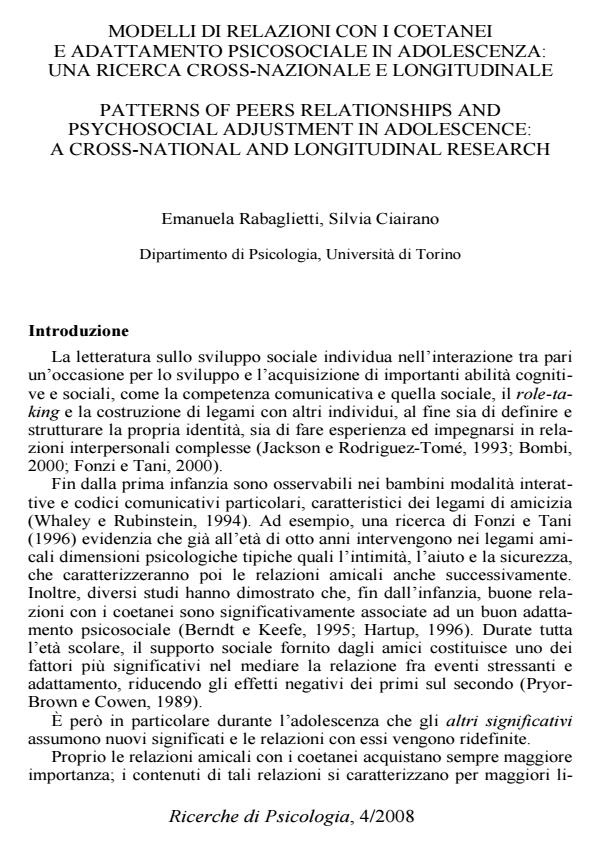Modelli di relazioni con i coetanei e adattamento psicosociale in adolescenza: una ricerca cross-nazionale e longitudinale
Titolo Rivista RICERCHE DI PSICOLOGIA
Autori/Curatori Emanuela Rabaglietti, Silvia Ciairano
Anno di pubblicazione 2009 Fascicolo 2008/4 Lingua Italiano
Numero pagine 30 P. 135-164 Dimensione file 746 KB
DOI 10.3280/RIP2008-004007
Il DOI è il codice a barre della proprietà intellettuale: per saperne di più
clicca qui
Qui sotto puoi vedere in anteprima la prima pagina di questo articolo.
Se questo articolo ti interessa, lo puoi acquistare (e scaricare in formato pdf) seguendo le facili indicazioni per acquistare il download credit. Acquista Download Credits per scaricare questo Articolo in formato PDF

FrancoAngeli è membro della Publishers International Linking Association, Inc (PILA)associazione indipendente e non profit per facilitare (attraverso i servizi tecnologici implementati da CrossRef.org) l’accesso degli studiosi ai contenuti digitali nelle pubblicazioni professionali e scientifiche
Modelli di relazioni con i coetanei e adattamento psicosociale in adolescenza: una ricerca cross-nazionale e longitudinale - The study is aimed at constructing a typology of patterns of peer relationships in Italy and the Netherlands and at investigating the longitudinal relationships with beliefs and expectations about relationships and school, psychological discomfort and antisocial and risky behaviour. 439 adolescents of both gender, aged from 15 to 20 years participated at the study. We described four patterns of 158 peer relationships: Isolated (dimension of network, time spent with friends and support perceived by friends were all low), Deep (only perceived support was high; more frequent among girls in both countries), Superficial (only quantitative aspects were high; more frequent among boys), Integrated (both quantitative and qualitative aspects). We found both stability (higher among Superficial and Integrated) and change (higher among Isolated and Deep). The Isolated showed the lowest beliefs and expectations and involvement in risk behaviours, the Deep and the Superficial showed intermediate levels of both beliefs and risk behaviour, and the Integrated showed the highest levels. We also found a great similarity in the links among relational models, beliefs, psychological discomfort and risk behavior in Italian and Dutch adolescents. However, when adopting the same relational model, the Italians perceived higher sense of alienation and depressive feelings and were more involved in lying and disobedience than the Dutch.;
Emanuela Rabaglietti, Silvia Ciairano, Modelli di relazioni con i coetanei e adattamento psicosociale in adolescenza: una ricerca cross-nazionale e longitudinale in "RICERCHE DI PSICOLOGIA " 4/2008, pp 135-164, DOI: 10.3280/RIP2008-004007